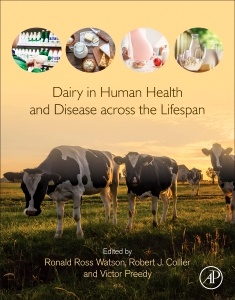Dairy in Human Health and Disease across the Lifespan
Coordonnateurs : Watson Ronald Ross, Collier Robert J, Preedy Victor R

Dairy in Human Health and Disease across the Lifespan addresses the contribution of milk to the human diet and health throughout the life span. This comprehensive book is divided into three sections and presents a balanced overview of dairy?s impact on nutrition from infancy to adulthood. Summaries capture the most salient points of each chapter, and the book provides coverage of dairy as a functional food in health and disease.
A. Milk and its components in infant and childhood nutrition for improved health 1. Health benefits of bovine colostrum in children and adults 2. The role of mfg-e8 in neonatal inflammation 3. Impact of bovine milk whey proteins and peptides on gastrointestinal, immune, and other systems 4. The role of fats in milk and dairy products in nutrition and health from infancy to adulthood 5. Human milk oligosaccharides and health promotion through the gut microbiome 6. Dairy products and obesity in children and adolescents 7. World milk production and socio-economic factors effecting its consumption 8. The benefits of alpha-lactalbumin in early childhood 9. Foodborne pathogens in milk and dairy products: genetic characterization and rapid diagnostic approach for food safety of public health importance 10. Using fortified milk as a vehicle for nutrients: from infancy to senescence 11. Cow’s milk consumption and child growth
B. Macro components and nutrients in dairy and their implications for human health and disease in young adults 12. The relevance of biogenic amines in dairy products 13. Benefits of lactobacillus helveticus fermented milk in sports and health 14. Whey protein and diabetes 15. B vitamins in cow milk: their relevance to human health special issue 16. Fermented dairy foods and cardiovascular risk
C. Milk and its products in human senior health and disease post menopause and seniors 17. Bioactive lipids in dairy fat 18. Effect of milk and dairy products on the components of the metabolic syndrome 19. Recent advances in dairy ingredients and cardiovascular diseases with special reference to milk fat components 20. Does dairy food have effects on cardiovascular disease and cardiometabolic risk? 21. Dairy consumption and age-related vascular dysfunction 22. Milk and fermented milk products in alleviation of aging pathophysiology 23. Emotional and sensory evaluation of cheese: the effect of health labels 24. Milk proteins: precursors of antioxidative peptides and their health benefits 25. Nutraceutical properties of dairy bioactive peptides 26. Fermented milks and cancer 27. Mold-ripened and raw milk cheeses: production, risks and benefits to human health 28. Benefits of whey proteins on human health 29. Kefir as a functional dairy product 30. Milk and chronic-degenerative diseases: main components and potential mechanisms 31. Lactase persistence, milk intake, and risk of ischemic heart disease and type 2 diabetes 32. The influence of dairy consumption on the risk of type 2 diabetes, metabolic syndrome and impaired glucose tolerance or insulin resistance: a review of cohort and intervention studies. 33. Dairy products and chronic diseases – evidence from population studies 34. Dairy intake during the adolescence period and risk of prostate- and breast cancer 35. Nutritional properties of milk lipids: specific function of the milk fat globule
Nutrition researchers, dairy and food scientists, graduate students, and health professionals (including nutritionists and dieticians)
Robert J. Collier received his B.S. degree in Zoology from Eastern Illinois University in 1969. After service in the Army Medical Corps he obtained his Master’s Degree in Zoology from Eastern Illinois University in 1973 and his Ph.D. in Dairy Science from the University of Illinois in 1976. His dissertation research was on the endocrine regulation of lactogenesis in the dairy cow. In 1976, Dr. Collier accepted an NIH post-doctorate at the Dairy Science Department of Michigan State University in the laboratory of Dr. Allen Tucker. His research was on the regulation of cortisol uptake in mammary tissue of cattle. In September, 1976, Dr. Collier joined the Dairy Science Department at the University of Florida as an Assistant Professor and continued his research on the endocrine regulation of lactation in cattle . . In 1985, Dr. Collier joined the Monsanto Company as a Science Fellow and initiated a discovery program in lac
- Presents various dairy products and their impact on health specific to various stages in the lifespan
- Provides information to identify which food and diet constituents should be used as dietary supplements based on modification of health and nutrition
- Incorporates contributions from an international team of authors with varying areas of expertise related to dairy and nutrition
Date de parution : 06-2017
Ouvrage de 490 p.
21.4x27.6 cm
Thème de Dairy in Human Health and Disease across the Lifespan :
Mots-clés :
ACE-inhibitory; Absorption; Adolescent; Adolescents; Aging; Alpha-lactalbumin; Anticarcinogen; Antimicrobial activity; Antioxidant; Antioxidant activity; Antioxidant capacity; Antioxidative peptides; Appetite; Arterial stiffness; B vitamin; Bacteria; Benefits; Benefits of bovine colostrum; Bifidobacterium; Bioactive peptides; Bioactive proteins; Bioactivity; Biogenic amines; Birth weight; Bone; Bovine colostrum; Bovine colostrum dietary supplements; Breast cancer; Breast milk; Calcium; Cancer; Carbohydrate; Cardio-metabolic risk factors; Cardiometabolic risk factors; Cardiovascular; Cardiovascular disease; Cardiovascular diseases; Cheese; Child growth; Children; Colostrum-induced immunity; Composition; Conjugated linoleic acid (CLA); Conjugated linoleic acid ganglioside sphingomyelin; Consumer; Cow's milk fats; Dairy; Dairy PPAR-agonists; Dairy consumption; Dairy cow; Dairy derived fatty acids; Dairy drink; Dairy fat; Dairy food; Dairy market; Dairy product; Dairy products; Development; Diabetes; Digestion; Emotion; Endothelial function; Exercise; Expectations; Fatty acids; Fermented dairy; Fermented milk; Food safety; Foodborne disease; Fortification; Full-fat dairy; Functional food; Functional properties; Fungi; Gastric emptying; Gastroenteritis; Genetic variation; Glucose homeostasis; Glucose tolerance; Glycosyl hydrolases; Health aspect; Health benefits; Health label; Height; Hepatdecaenoic acid c170; Human colostrum; Human health; Human milk; Human milk fats; Human milk oligosaccharides; Human-pathogenic microorganisms; Hypertension; IGF-I; Immunoglobulins; Immunosenescence; Incretin hormones; Infant formula; Infant gut microbiome; Infants; Inflammation



